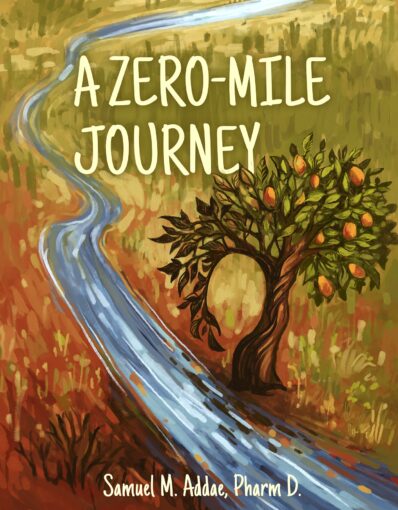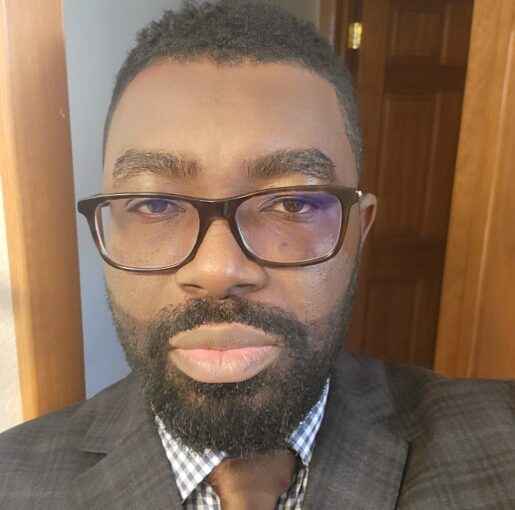Behind the book A Zero-Mile Journey, by Samuel M. Addae
New Ghanaian American author Samuel M. Addae takes the reader behind his just-published biography A Zero-Mile Journey

Writing a novel takes imagination, descriptive powers, physical and mental energies, and patience. Unfortunately for me, I wasn’t born into a family of connoisseurs of literature. Growing up in Ghana, my mother sold groceries at the market, and my father was in the military. Neither of them had an education beyond middle school. And that wasn’t by choice. The reason for my mother’s truncated education was simple: middle school was sufficient for a girl who would marry one day and carry somebody else’s family name. My father, on the other hand, lost his mother at a young age. His father was absent, so he lived with his maternal grandmother, who died and willed her properties to him and his younger sister. My father’s uncle absorbed the inheritance. When my father passed the O’ level exam, he couldn’t go to secondary school because if his uncle’s children couldn’t pass the same exam to go to secondary school, then my father couldn’t.
Survival forced my father into the military; this wasn’t a good fit for him, so he had to find work elsewhere. With only a middle school education, he was at the mercy of luck. He knew the best chance for the survival of his family of seven was life outside the country, as political corruption was suffocating every facet of life. He left Ghana for North Africa in the late 70s courtesy of his older half-brother who had moved there. (After the colonial era, life abroad was seen by many as an avenue for survival, procurement of wealth, and how to be seen as somebody in the Ghanaian society. The perception hasn’t changed as the recalcitrant gene of corruption that our leadership inherited from its forebears seems to have metastasized into today’s body politic.)
In the early 80s, my father came for my mother to work alongside him in North Africa, necessitating my siblings’ relocation to another town in the care of our mother’s uncle. Our suffering continued there despite perennial remittances to our granduncle from our parents. Here, lunch was absent from our vocabulary. Sometimes food came once a day. I don’t remember if I weighed more than thirty-five pounds at age ten. One of my siblings developed a stomach ulcer from this austere home life. He contracted more than that: one day, his torn schoolbag gave away where our granduncle’s missing meat pie went.
Our parents eventually moved back to Ghana in the late 80s. Our financial life soured shortly after that because the family size had bulged to eight, and corruption-induced harsh economic reality persisted. My father set his sights on abroad again, this time in the West, arriving in America in 1990, where the family is currently ensconced.

Walking the campus of the City College of the City University of New York in the late 90s, it dawned on me that I would one day write a book about my life’s journey, with the above serving as the impetus. I knew it wouldn’t be autobiographical, though real-life events would inform significant portions. I didn’t fully know whether it would be non-fiction or fictionalized non-fiction, literary or otherwise. All I knew was that the story would be authentically African without the motivation to imitate another writer or novel.
The rigors of immigrant life put this dream on hold. In 2012 or thereabout, years after I’d started working as a clinical pharmacist, the dream was excavated. To prepare for this task, I didn’t read any book or commentary or attend lectures on how to write a book. I didn’t want my novel to come out following someone’s motif or convention of book writing. Instead, I read modern classics including One Hundred Years of Solitude, by Gabriel Marquez; Aké: The Years of Childhood, by Wole Soyinka; The House of the Spirits, by Isabel Allende; The Famished Road, by Ben Okri; I Claudius, by Robert Graves; The Stranger, by Albert Camus; and Life and Times of Michael K, by JM Coetzee, etc. I didn’t want A Zero-Mile Journey and its sequel (sequel to be published later) to mimic any of these; I just wanted to know what defined a good novel—i.e., in my humble perception of a good novel.
The first draft read like listening to a million tortured voices. It was a disjointed mess of ideas and scenes. Distilling many ideas into a cohesive whole can be daunting. As I wrote sparingly, I thought working full-time shifts with on-call responsibilities was to blame. Frustrated, I dropped everything and read a book. Every time I stepped away from my writing, it gave me new insights into my novel. That didn’t fully erase my frustration, though. But Joseph Heller’s Catch-22 gave me hope. Here was an author whose first language was English. He also taught it at Pennsylvania State University. Above all, he was a Fulbright scholar writing about his own war experience, albeit a satire. I felt it should have taken far less time to write it than the eight years it took him. So why should I be frustrated when English is my second language? Why should I be frustrated when Ayn Rand’s Atlas Shrugged took fourteen years to write?
Six years after I started, I felt I had a complete product. I gave it to a friend, an English instructor, for her opinion. After getting through a third of the novel, she commented, “Sam, don’t rush this book.” I didn’t know if what she read had a varnish of amateurishness or simply because she saw something—a potential! Her follow-up commentary alleviated my fears: It was the latter. I had other people read it, too. They pointed out things here and there—some obvious, others not so much. Of significance, as I discovered each time I read the novel, there are structural problems that an author may be better positioned to spot than a casual reader. So, I kept reading and re-reading and was catching problems/errors others had missed. That is, until I was satisfied with the novel.
I’ve never read a perfect novel, so, at one point, I knew I had to stop trying to attain perfection. Eleven years later, the first part of the two-book series, A Zero-Mile Journey, was published—in November 2023.
One of the curious questions I’ve been asked is, “How long did it take you to write it?” Though I haven’t asked what provoked the question, I assume these readers could see the effort that went into it. Perhaps, too, they were wondering how a full-time clinical pharmacist with on-call responsibilities had the time to write a novel.
To purchase the book, click on any of the links below:
Soumanou Salifou (administrator)
Soumanou is the Founder, Publisher, and CEO of The African Maganize, which is available both in print and online. Pick up a copy today!

